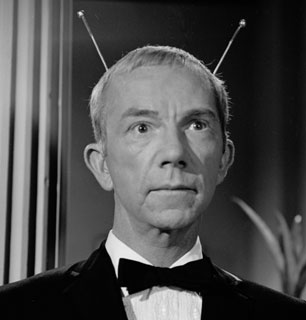David Kopel over at Volokh has a post about a strange theme he discovers running through 60's sitscoms: the hidden alien and relatedly, the family that doesn't know it is strange. He puts Mr. Ed, My Favorite Martian, I Dream of Jeannie, and My Mother the Car in the former category, while the Addams Family, The Munsters, and Beverly Hillbillies go into the latter. He wonders if there is some suggestion of closeted gays in this repetition.
I can think of many reasons why this is not the case, discussed below, yet would still give it a qualified agreement. The entertainment business was close to the only sector to accept homosexuality, and even there it was not reliable. It was part of a general acceptance of people a little different from the norm. There was a lot of posturing and self-congratulation about it - Hollywood (New York, LA general) was not the only place which accepted Women Who Speak Their Minds or liberal political ideas; nor was it entirely deserved - other American sectors were less racist, for example. But in the main, the arts and entertainment industries were a place where a person could acknowledge or even flaunt homosexuality. So the writers for My Favorite Martian probably never had the idea of gay acceptance cross their minds, but the idea of the hidden, shameful idea actually being quite all right was likely not far from the surface.
The shows remained heteronormative for one obvious reason and one less obvious. A) They had to appeal to an audience, make money, stay on the air. B)Acceptance of gays was less a principle than a tradeoff: don't say my divorces/affairs/fetishes are wrong, and I won't criticise your homosexuality. That is often how such tolerances develop - religious tolerance here and in Western Europe owes much to property rights, for example. I don't care if you hate Quakers, Hiram. He bought the property and it's his and you can't make him move out. Unless you want the deacons to decide whether you own your piece or not. That it was tradeoff, not principle, has come back to bite them when it comes to child molestation. If Whoopi Goldberg objected to it on principle she would never say "It wasn't rape rape." That's the statement of a person being given a pass to say and do what she wants in exchange for extending that to others.
Back to sitcoms: I wrote in 2009 that a stronger theme was Missing Family Members (especially Mom). The possible creepiness of this I discuss there.
The Unusual Family motif may also draw a great deal from ambivalence about families of origin. The Munsters may simply be an exaggerated "My Big Fat Greek Wedding." I mentioned that the weird families tended to be the intact ones: Munsters, Addams, Simpsons. It's comedy by inversion, like Superman's Bizarro. It's been used for centuries because it sets up laffs quite well. It also sets up sentimentality in comedy, of filial bonds despite it all, etc.
Ambivalence is key for comedy. I Dream of Jeannie clearly plays to the subtext "OMG! That guy has a beautiful woman who will do whatever he tells her to!" (Wink, wink, nudge, nudge.) Yet consider - the show isn't funny if she doesn't have superpowers. A guy finds a pretty girl who does what he says - you could sell some episodes of that on a porno channel. You could use it as a comic bit from a minor character in a larger movie. But what are you going to write for jokes for twenty-five episodes? Tangentially, I knew even as a child (12.5) that Tony was entirely oblivious/resistant to the sexual angle of all this, but that his friend Roger wasn't. I don't see it in the scripts - Bill Dailly must've done it entirely with his facial expressions. Bewitched follows the older, Lucy-and-Ethel type of crafty-shemes-behind-hubby's-back comedy, except now the woman is clearly the more powerful one.
Secrecy, where the audience knows things the character onstage doesn't, is also comedy gold. No need to wonder if My Mother The Car is actually My Mother The Secret Drinker But Is Still A Really Nice Person, or Mr. Ed represents Wilbur's B&D dungeon. It's the fun of comedy, and if darker elements are there, they are of necessity vague and far away.
These themes recur in TV in later decades, but in the 70's were largely replaced by Wacky Ensembles: WKRP, Mary Tyler Moore, MASH, Taxi, Muppets, Happy Days, Welcome Back Kotter, Laverne & Shirley - I imagine my clever audience can think of others.



2 comments:
I think the "alien in the basement" theme is a bit more universal; echoing several possible things.
Any family that is big enough is going to have a weird uncle who almost literally can't talk of anything but Great Lakes shipwrecks, or a cousin who votes Republican, or a niece who lives on a commune in Tennessee. You suck it up and learn to live with having conversations about the weather take a sudden turn to describing the fate of the Christmas tree ship. Only when a visitor comes do you recall how jarring it can be.
And when we were young, how many of us were embarrassed by little sister or how out-of-it our parents were?
And again, how many of us felt like aliens ourselves when we were young?
What I remember from sitcoms like Bewitched and I Dream of Jeannie (and for that matter from movies like Funny Girl) is that the woman is talented and/or powerful, but has to walk on eggshells so that the man in her life won't feel inadequate and leave her.
Post a Comment